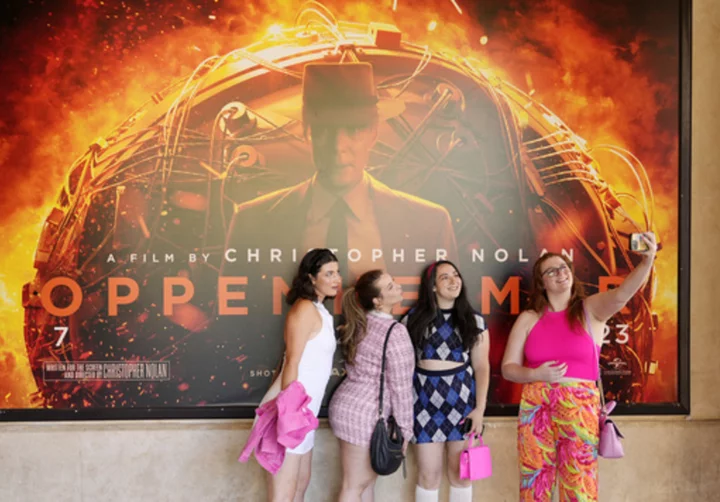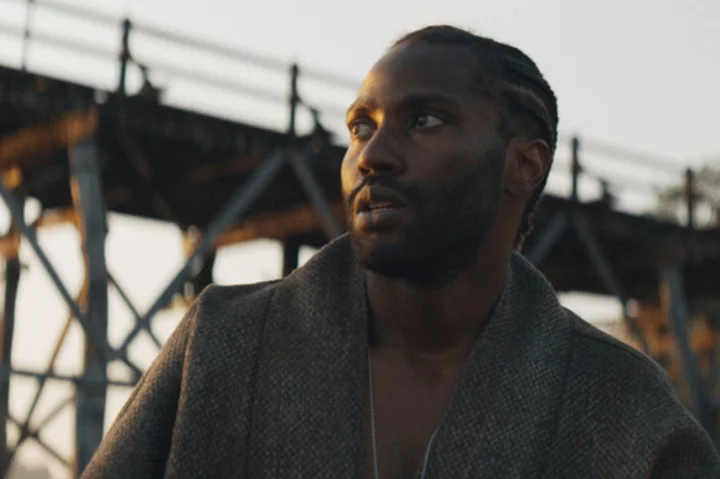TALLINN, Estonia (AP) — The movie centers around a violinist from Belgium arriving to Kyiv to perform. It is February 2022, and his trip is upended as Russia starts bombing Ukraine. The artist survives a series of “inhuman crimes and bloody provocations by Ukrainian nationalists,” and he is ready to tell the world “what it was really like.”
“The Witness” — a state-sponsored drama that premiered in Russia on Aug. 17 -- is the first feature film about the 18-month-old invasion. The first feature film about the 18-month invasion of Ukraine to hit movie theaters nationwide, it depicts Ukrainian troops as violent neo-Nazis who torture and kill their own people. One wears a T-shirt with Hitler on it. The film also has the main character’s young son wondering: “Isn’t Ukraine Russia?”
It’s the narrative the Kremlin has been promoting since the first days of the war — all packaged up in a motion picture.
The release of “The Witness” comes after Russian authorities announced a plan to boost production of movies glorifying Moscow’s actions in Ukraine.
But in an era of instantaneous information and disinformation in wartime and other times, it is a big question whether such films will attract viewers. Similar movies have been box-office disasters. Plus, sociologists say the public interest in following the war has waned, and people these days mainly want to escape from the gloom and doom of news from Ukraine.
“We regularly hear (from respondents) that it’s a huge stress, a huge pain,” says Denis Volkov, director of the Levada Center, Russia’s top independent pollster. Some Russians, he says, insist they “don’t discuss, don’t watch, don’t listen” to the news about Ukraine in an effort to cope.
Controlling imagery has been a regular feature of dictatorships. Propaganda films were produced in the Soviet Union, Nazi Germany and Italy under Benito Mussolini — as well as in North Korea and the Middle East. In today’s Russia, authorities speak openly about their intention to bring the Ukraine war — or, rather, the Russian narrative around it — to the big screen.
Russian President Vladimir Putin has ordered the Culture Ministry to ensure theaters screen documentaries about the “special military operation,” as the Kremlin calls its war in Ukraine. The ministry also has prioritized themes when allocating state funding for films, including “heroism and selflessness of Russian warriors” in Ukraine and “battling modern manifestations of the Nazi and fascist ideology” — a false accusation Putin makes about Kyiv’s leaders.
The amount of state funding that makers of Russian films can tap into this year is higher than ever: 30 billion rubles (about $320 million). That’s a pivotal part of today’s industry, which has been heavily dependent on state funding for years.
Russian film critic Anton Dolin describes it as a “vicious system when the state is the main and richest producer in the country.” Dolin notes that all films have to get a screening license from the Culture Ministry. So “censorship mechanisms” work even for those who don’t take money from the government.
That doesn’t mean, however, that Russian filmmakers who get state funding always produce propaganda. There is also “very decent cinema” out there, says critic and culture expert Yuri Saprykin.
Some Oscar nominees from Russia received state funding. And there were other domestic hits: widely watched historical dramas, sci-fi blockbusters, portrayals of legendary Soviet athletes.
After Russia’s brief war with Georgia in 2008, Russian state TV broadcast a film reflecting Moscow’s version of how its neighbor started the conflict. Its storyline was somewhat similar to that of “The Witness”: a foreigner witnesses the beginning of the war and embarks on a mission to bring the truth to the world.
After the 2014 illegal annexation of Crimea, the Kremlin’s narratives spilled into movie theaters. Two state-funded films were heavily promoted by state media: the 2017 film “Crimea” justified Moscow’s seizure of the peninsula, showing Ukrainians brutally beating and killing their compatriots; the 2018 state-sponsored romantic comedy focused on a Putin pet project — a bridge linking Crimea to the mainland — and depicted local residents thriving under Russia’s reign. Both eventually failed at the box office.
At the time, Russians had an alternative: Hollywood blockbusters that were always much more successful. So much so that at some point Russia’s authorities started postponing releases of Hollywood hits that coincided with domestic movies they wanted to succeed.
“Any Spider-Man movie, any Marvel movie, any `Star Wars’, any American film earned a fortune in Russia,” said Ivan Philippov, creative executive at AR Content, production company of renowned film producer Alexander Rodnyansky.
Overall, the Russian industry over the years expressed little interest in making propaganda films about Moscow’s conflict in Ukraine: of hundreds of movies released in Russia every year, only about a dozen since 2014 have been dedicated to this topic, Philippov said.
He expects this number to grow and points to two in the works in addition to “The Witness.” One follows a Moscow artist who decides to join the Kremlin-backed separatist insurgency in eastern Ukraine. Another one is about Russian troops trying to save a group of Indian students trapped in a Ukrainian city by “nationalists” as Moscow’s “special military operation” unfolds.
After major Hollywood studios halted their business in Russia last year, the competition is not as fierce, though some hits still trickle through in the form of pirated copies and there are foreign movies available.
But other Russian films out there are proving extremely popular among moviegoers. “Cheburashka,” a colorful fairy tale featuring the iconic Soviet cartoon character that was released during the New Year holidays this year, earned nearly 7 billion rubles ($74 million) against the 850 million (roughly $9 million) spent on making it.
Philippov says no one in the industry could even imagine such earnings, and filmmakers are following suit, remaking Soviet classics and turning to fairy tales. Russians “don’t want to watch (films) about the war" was the conclusion the industry made, he says.
“The Witness” premiered in Russia without much fanfare. At a movie theater in Moscow on a rainy Sunday afternoon last week, almost a dozen movie-goers said they came to see films other than “The Witness,” though several said they planned on watching it at some point. During its first weekend, it had earned just over 6.7 million rubles — or about $70,000.
That’s not entirely surprising, if you ask Ruth Ben-Ghiat, a history professor at New York University who studies authoritarianism and propaganda.
“When an authoritarian is in a defensive position and is waging a war and it’s not going well,” she says, the films made for indoctrination purposes are “not often very good.”
___
Associated Press film writer Jake Coyle contributed from New York.









